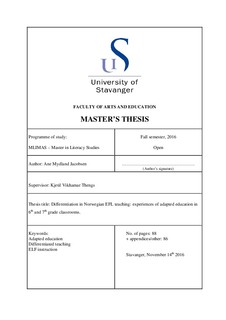| dc.contributor.advisor | Thengs, Kjetil Vikhamar | |
| dc.contributor.author | Jacobsen, Ane Mydland | |
| dc.date.accessioned | 2017-01-06T15:13:58Z | |
| dc.date.available | 2017-01-06T15:13:58Z | |
| dc.date.issued | 2016-11-14 | |
| dc.identifier.uri | http://hdl.handle.net/11250/2426644 | |
| dc.description | Master's thesis in Literacy studies | nb_NO |
| dc.description.abstract | Norwegian legislation requires teachers to adapt the instruction to the needs and abilities of all their pupils. This thesis presents a study about differentiation in Norwegian EFL teaching, focusing on experiences of adapted education among teachers and pupils in 6th and 7th grade classrooms. The study seeks to investigate attitudes towards and experiences of adapted education in ELF teaching.
Data was collected from two schools, using mixed research methods. The researcher conducted qualitative interviews of nine teachers and gathered quantitative data through questionnaires answered by 182 pupils. The main reason that these two schools were chosen was due to the structure of their EFL teaching. The two schools used the same textbook (Stairs) and its system of division into three steps. They both divided their pupils according to these steps, yet in different ways. One school practiced a whole class approach, teaching EFL in the pupils’ original classes. The other school divided the pupils into groups according to which step they worked at, and did the EFL instruction in these groups. One of the main aims of this research was to look at advantages and disadvantages of these two approaches to EFL instruction.
Findings indicate that the teachers had a common understanding of the term adapted education and they believed that they put adapted education into practice. At the same time, they expressed that it was not an easy thing to do as they were obligated to adapt the instruction to the needs of all their pupils every day. This might be due to the fact that none of the teachers experienced that their school had any clear guidelines as to how adapted education should be implemented. Nevertheless, all nine teachers believed that their pupils experienced adapted education. Furthermore, results showed that the teachers who taught EFL in differentiated groups found it easier to implement adapted education in English compared to the teachers who practiced the whole class approach.
The findings among the pupils showed that those within the differentiated groups approach seemed overall more content with their English instruction compared to those within the whole class approach. A common concern when implementing ability grouping is that the weaker pupils might feel inferior. An interesting finding in this context was that neither teachers nor pupils seemed to experience this as a problem. The main advantages of the whole class approach reported by the pupils were that some would feel safer in their original class, that they did not have to move between classrooms, they could learn from each other across steps and avoid social stratifications. The main arguments for the differentiated groups approach were that someone might feel inferior in a whole class setting, more efficient lessons when the focus was on only one step, ease the teachers workload and improvement of learning outcome. When asked which teaching approach they favored, the majority of both teachers and pupils reported a preference towards the differentiated groups approach.
This study contributes to the field of differentiated teaching and shows that there is a need for more research on how differentiated teaching and adapted education should be implemented in practice. It shows tendencies that teachers are uncertain as to how they might accomplish this requirement, since neither Norwegian legislation, universities nor the schools give them any clear guidelines as to how this should be done. | nb_NO |
| dc.language.iso | eng | nb_NO |
| dc.publisher | University of Stavanger, Norway | nb_NO |
| dc.relation.ispartofseries | Masteroppgave/UIS-HF-IKS/2016; | |
| dc.rights | Navngivelse 3.0 Norge | * |
| dc.rights.uri | http://creativecommons.org/licenses/by/3.0/no/ | * |
| dc.subject | EFL instruction | nb_NO |
| dc.subject | adapted education | nb_NO |
| dc.subject | differentiated teaching | nb_NO |
| dc.subject | lesevitenskap | nb_NO |
| dc.subject | literacy studies | nb_NO |
| dc.subject | utdanningsvitenskap | nb_NO |
| dc.subject | språkopplæring | nb_NO |
| dc.title | Differentiation in Norwegian EFL teaching: experiences of adapted education in 6th and 7th grade classrooms. | nb_NO |
| dc.type | Master thesis | nb_NO |
| dc.subject.nsi | VDP::Humaniora: 000::Litteraturvitenskapelige fag: 040 | nb_NO |

